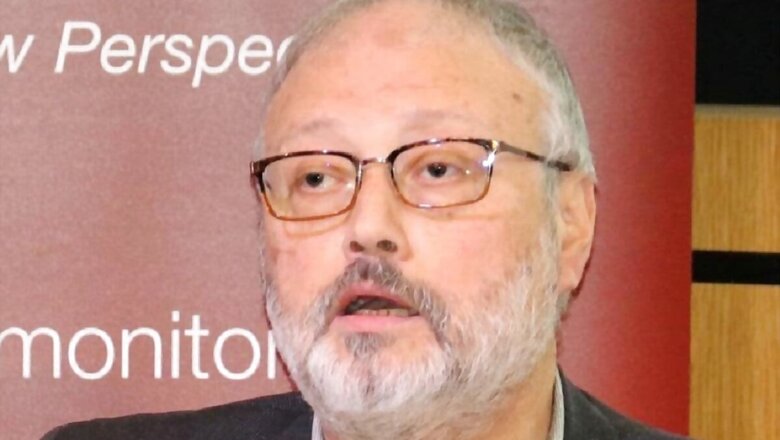
views
The explosive US finding that Saudi Crown Prince Mohammed bin Salman ordered the killing of journalist Jamal Khashoggi promises fresh turbulence between the allies but it is doubtful that Washington will shun the kingdom’s de facto ruler.
The decision to declassify the report on Khashoggi’s grisly killing inside the Saudi consulate in Istanbul in October 2018 marks a major departure by US President Joe Biden from his predecessor Donald Trump, who boasted of close ties with the kingdom.
The report concluded, as had been widely reported, that Crown Prince Mohammed approved the killing of Khashoggi, a US-based opinion contributor to The Washington Post who had written critically about the powerful 35-year-old known by his initials MBS.
Biden has already given a cold shoulder to MBS — who had cultivated a friendship that included WhatsApp messaging with Trump’s son-in-law Jared Kushner — with the White House saying that the president considered ailing 85-year-old King Salman his counterpart.
But officials acknowledged they would also have to deal with the crown prince, who has increasingly been seen as running the show in Riyadh including leading Saudi Arabia’s devastating war in Yemen and ordering a controversial purge of prominent Saudis.
“Just because you want this, and you don’t like dealing with MBS, it doesn’t mean to say it’s going to happen that way,” said Simon Henderson, a fellow at the Washington Institute for Near East Policy.
“Frankly, I think MBS is too powerful in the kingdom for his position to be jeopardized.”
A report last year by the left-leaning Century Foundation, which urged a greater emphasis on human rights and a lessening of the US footprint in Saudi Arabia, said that some critics believed MBS could turn the kingdom into a “rogue state.”
But the study said that others felt that MBS may have already understood that he overreached, pointing to feelers he has sent to regional adversaries Iran and Qatar and Yemen’s Huthi rebels.
“For all his sins, Prince Mohammed may lead his country for decades and leave a transformative mark. It would be costly to make him a US adversary,” it said of this point of view.
The alliance between the democratic superpower and the ultra-conservative Islamic kingdom famously began with a 1945 meeting on a US cruiser between president Franklin D. Roosevelt and king Abdul Aziz Ibn Saud as the United States secured access to oil that would fuel the post-World War II economic boom.
But with the United States now the top producer of oil and rapidly seeking to diversify from fossil fuels, experts say that it has far less economic dependence on the Saudis.
In turn, Saudi Arabia relies on its military integration with the United States, giving leverage — witnessed by Biden’s announcement that the United States would no longer support Saudi Arabia’s offensive operations in Yemen.
The United States under George W. Bush largely sought to preserve a smooth relationship with Saudi Arabia after the September 11, 2001 attacks — in which 15 of the 19 hijackers were from Saudi Arabia.
But lawmakers of Biden’s Democratic Party are increasingly calling for a new approach.
Senator Chris Murphy, a leading critic of Saudi Arabia, has questioned whether Saudi Arabia can be seen as aligned with US interests when it has built tens of thousands of Islamic schools promoting its ultra-conservative Wahhabi ideology around the world, especially in Pakistan.
Beyond valuing Saudi Arabia’s purchases of US weapons, Trump saw the kingdom as a vital ally against Iran, an arch-enemy for the former administration.
Biden, like his former boss Barack Obama, takes a more nuanced view of the region and wants to reopen diplomacy with Iran and extricate the United States from proxy battles in the region.
Trump had heavily courted MBS on one of his administration’s top priorities — winning Arab recognition of Israel, with four nations making normalization promises last year.
Saudi Arabia would have been the key prize but experts say the holdup is the king, who believes firmly in a 2002 Saudi-led initiative that offered Israel recognition in return for withdrawal from Palestinian territories.
MBS, who according to Israeli media met Prime Minister Benjamin Netanyahu last year despite Saudi denials, by contrast sees the Jewish state as a partner in his economic plans.
“He has his own interests in normalizing with Israel,” Henderson said. “The question that we have to consider is how he relates to the United States and how he responds to what he must regard as being outrageous political pressure.”
Read all the Latest News, Breaking News and Coronavirus News here















Comments
0 comment